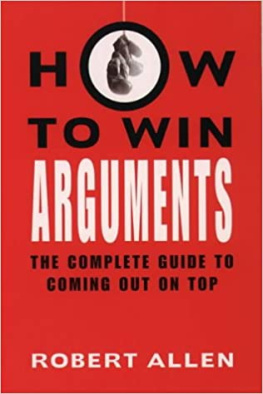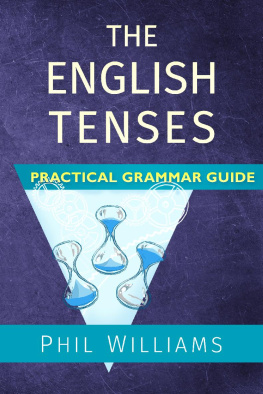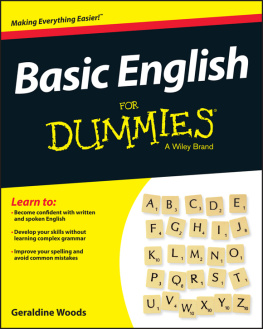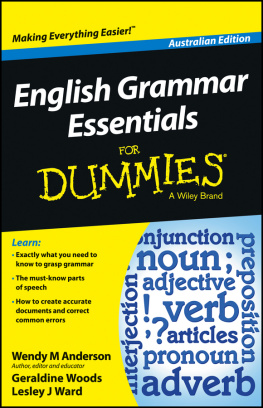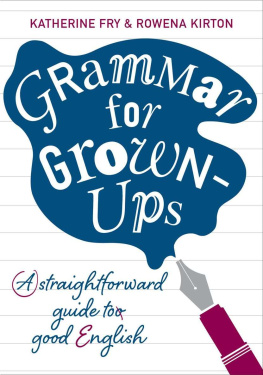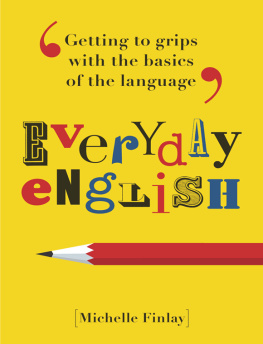PENGUIN WRITERS GUIDES
How to Write Better English
Robert Allen is an experienced lexicographer and writer on a wide range of language issues. He edited the Pocket Oxford edition of Fowlers Modern English Usage and is editor-in-chief of the Penguin English Dictionary. He lives in Edinburgh.
The Penguin Writers Guides
How to Punctuate George Davidson
How to Write Better English Robert Allen
How to Write Effective Emails R. L. Trask
Improve Your Spelling George Davidson
Writing for Business Chris Shevlin
PENGUIN WRITERS GUIDES
How to Write Better English
ROBERT ALLEN

PENGUIN BOOKS
PENGUIN BOOKS
Published by the Penguin Group
Penguin Books Ltd, 80 Strand, London WC2R 0RL , England
Penguin Group (USA) Inc., 375 Hudson Street, New York, New York 10014, USA
Penguin Group (Canada), 10 Alcorn Avenue, Toronto, Ontario, Canada M4V 3B2
(a division of Pearson Penguin Canada Inc.)
Penguin Ireland, 25 St Stephens Green, Dublin 2, Ireland
(a division of Penguin Books Ltd)
Penguin Group (Australia), 250 Camberwell Road,
Camberwell, Victoria 3124, Australia (a division of Pearson Australia Group Pty Ltd)
Penguin Books India Pvt Ltd, 11 Community Centre, Panchsheel Park, New Delhi 110 017, India
Penguin Group (NZ), cnr Airborne and Rosedale Roads, Albany, Auckland 1310, New Zealand (a division of Pearson New Zealand Ltd)
Penguin Books (South Africa) (Pty) Ltd, 24 Sturdee Avenue,
Rosebank 2196, South Africa
Penguin Books Ltd, Registered Offices: 80 Strand, London WC2R 0RL , England
www.penguin.com
First published 2005
Copyright Robert Allen, 2005
All rights reserved
Extracts from Guards! Guards! by Terry Pratchett reproduced by permission of Victor Gollancz Ltd; Mr Enderby by Anthony Burgess copyright Estate of Anthony Burgess; and The Book and the Brotherhood by Irish Murdoch copyright 1987, reprinted by kind permission of the Estate of Iris Murdoch
The moral right of the author has been asserted
Except in the United States of America, this book is sold subject to the condition that it shall not, by way of trade or otherwise, be lent, re-sold, hired out, or otherwise circulated without the publishers prior consent in any form of binding or cover other than that in which it is published and without a similar condition including this condition being imposed on the subsequent purchaser
ISBN: 978-0-14-194135-6
Contents
Preface
A book about writing better English is largely, but not entirely, a book about grammar, because grammar is the expression of the way a language works. In Britain since the 1970s, the teaching of English in schools has been in turmoil as different educational viewpoints have come and gone. Old grammatical models have been swept aside but nothing substantial has been put in their place. This leaves many people uncertain about the role of grammar in their language and afraid of having to face up to it. They shouldnt be. In fact, everyone knows a great deal more than they realize about the grammar of the language they speak as their mother tongue, and in this book I have tried to show how you can build on what you already know to write and speak better English for a wide range of purposes. As for not entirely, I have included advice on techniques for using English imaginatively and colourfully, taking the topic well beyond mere considerations of correctness, important though these are.
Writing this book has been a great pleasure for me and I would like to thank several people for their help and support: Anne Seaton, with whom I have had many stimulating and rewarding discussions about English and the way it is used, George Davidson, who has written companion books on spelling and punctuation in this series, and the publishers at Penguin, in particular Sophie Lazar, who read a first version of the book and made many suggestions that have enabled me to improve it in important ways. Finally, I must thank the copy-editor, Mark Handsley, who has greatly enhanced the organization and appearance of the text.
RobertAllen
Edinburgh, 2005
About this book
What you are looking for
This book is about writing better English, and also about speaking better English, because achieving the first will help you with the second. Since you have picked the book up even if it belongs to someone else! you are probably interested in using language and have some idea of what it is all about. Writing is important to all of us in our everyday lives, especially now with the increased use of word processing and the huge explosion of communication by the Internet and other electronic means. All the more reason to be sure we are making the best use of our language and getting the message across successfully.
These are probably the main areas of support that you are looking for in a book like this:
- understanding the grammar and working of English more fully, intimidating though they seem.
- coping with problem words and phrases.
- knowing what really matters: being able to distinguish important issues from mere fads and obsessions about language.
- above all, acquiring techniques for writing more clearly and effectively, and when necessary creatively: being able to write better English.
What is better English?
But what exactly is better English and how does it differ from bad English? How do writers achieve better English? Is it just a matter of knowing rules and grammar, or is there more to it? What is grammar, and who makes the rules?
Many people are alarmed at the word grammar, and are put off it by the fear that it is a set of complicated and difficult rules; but grammar is not as daunting as you might think. It is simply the ways in which words are used and the patterns of usage that have become established in the language over many centuries of use and change. People who know English use these patterns instinctively, as we shall see in the first section, and you will discover that you have a lot more grammar in your head than you realize.
To appreciate this you need to think about what language is and what it is for. If you speak a language you use certain devices and patterns intuitively. You dont have to stop and think about them (for most of the time at least) but can reproduce them instinctively. Here are a few simple examples of this:
changes of word form: many words change their forms, e.g. nouns (naming words) when they refer to more than one (the plural, as in houses and children) and verbs when you say he cooks instead of I cook; and you know when to say we are cooking instead of the simpler form we cook. (This last distinction, incidentally, can cause big problems to learners of English.)
word order: The dog bit the man and The man bit thedog have very different meanings although the words used are exactly the same.
fixed patterns: when you use adjectives (describing words), those referring to size come before those referring to colour: a little green car (not a green little car).
irregular features: most verbs add -ed to refer to the past (cook, cooked; land, landed) but some can end in -t (learn, learned or learnt) and others change completely (come, came; stand, stood).
If you think about rules as patterns they seem much less daunting because many of them are already embedded in your mind and you use them instinctively. You can build on your instinctive knowledge of English to become more aware of the way it works and to make your use of language more effective and interesting. This is in essence what we mean by



